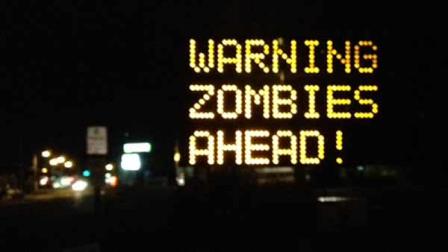
In the popular TV series “The Walking Dead,” humans struggle to escape from a pack of zombies hungry for flesh. Prank alerts have warned of a zombie apocalypse on radio stations in a handful of states. And across the country, zombie wannabes in tattered clothes occasionally fill local parks, gurgling moans of the undead.
Are these just unhealthy obsessions with death and decay? To Clemson University professor Sarah Lauro, the phenomenon isn’t harmful or a random fad, but part of a historical trend that mirrors a level of cultural dissatisfaction and economic upheaval.
Lauro, who teaches English at Clemson, studied zombies while working on her doctoral degree at the University of California at Davis. Lauro said she keeps track of zombie movies, television shows and video games, but her research focuses primarily on the concept of the “zombie walk,” a mass gathering of people who, dressed in the clothes and makeup of the undead, stagger about and dance.
Read more
No comments:
Post a Comment